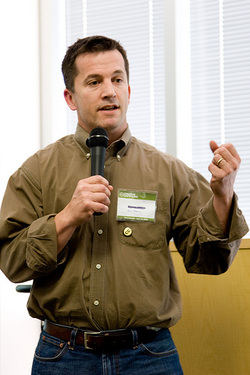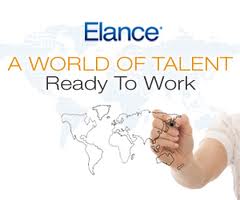
You can see part 1 here, 45 Virtual Jobs You Can Do From The Beach.
And part 2 here.
Last week I had the chance to interview Rich Pearson, the Chief Marketing Officer of Elance.com, the world’s biggest online work community. I asked Rich how Elance functions, what kind of virtual jobs are available, and whether it is indeed possible for a semi-talented writer to work from the beach in the tropics.
Before becoming the CMO at Elance four years ago, Rich worked at Yahoo, Bing Technology, and other tech start-ups. He’s an alumni of Cal-Berkeley and the Walter A. Haas School of Business, and alongside his wife and kids, enjoys traveling to places like England, Thailand, and Nigeria, to vacation, work, or experience the expat lifestyle.
What is Elance?
Elance.com is the world’s largest online work platform. But instead of being another online job posting board, like Craigslist or CareerBuilder, Rich describes Elance as “Online dating for business and freelancers.”
Based out of Mountain View, California and Olslo, Norway, Elance was launched in its present form in 2007. Since then they have paid out over $750 million dollars to freelancers (or e-lancers). Approximately 500,000 businesses actively use Elance, posting 3,500 new jobs every day for 2.5 million freelancers. Rich anticipates that Elance will pay out about 300 million dollars to freelancers in 2013 alone.
How does it work?
When a business or individual needs work done, but doesn’t want a full-time employee (or another warm body sitting in the office) they can post a job on Elance to attract freelance workers. These workers apply for the job through the site, displaying their skills and past work experience through their Elance profile, which acts as an online resume. If they are awarded the job they interact with the employer directly, do the work, and get paid, all through Elance. The employer and the freelancer can be located in the same town or on opposite ends of the world – it doesn’t matter.
It’s interesting to note that all of this takes place through the Elance platform. Most employment sites just match people up and take a finder’s fee, leaving everyone on their own and hoping for the best. But Elance only gets paid when the job is done and the employer pays the freelancer, so they have a huge vested interest in making sure it’s all done right. The fee for their service is 8.75% of the total cost of that job, which is added on to the bid so it’s not out of the freelancer’s paycheck.
What kinds of freelance jobs are available on Elance?
Rich defines a virtual career as “Anything you can do in front of a computer,” which definitely fits our dream of working from our laptops on a beach in the tropics. He breaks down what the virtual jobs on Elance consist of:
40% are tech jobs, mostly mobile application development, web design, and coding. 40% are considered creative jobs, like blog or article writing, graphic design, search engine optimization, and social media marketing. The remaining 20% is a great mix of jobs for virtual assistants, architects, accountants, and even attorneys. Those last three fields are growing the fastest, Rich reports.
When I ask Rich if virtual careers are gaining popularity, he says they are “An unstoppable force.” Indeed, the marriage of virtual careers and freelancing is both pulling and being pushed by technological and social forces, forever changing the way we work. Elance is only one aspect of that change, but it’s a big one, with triple-digit growth every year. I can think of no more telling flashing neon endorsement of this phenomenon than the fact that Elance employs about 80 full time workers but 150 freelancers on a regular basis.
How are freelancers paid?
Most work is project-based but some employers do pay hourly. The paychecks range from quick $10 jobs to projects costing thousands of dollars. Elance uses an internal escrow system to handle all payments, the only site of their kind in the world that has that capability. The freelancer’s fee is set and then broken into installments to be paid out at predetermined milestones as the work is completed, so everyone stays on track.

Elance has carefully refined their system to make sure that everyone plays nice. If there’s ever a complaint, they have a team who will investigate the matter, based on the project communication that was all documented on their site. There is even a third-party arbitration system to work out a solution if it ever comes to that, but less than 1/4 of 1% of work projects end up in dispute, and they are quick to remove employers or freelancers who don’t follow rules, act inappropriately, or don’t fit into Elance’s professional culture.
Both freelancers and employers receive ratings as they complete projects, calculated by a score. So the more jobs you do, and the more jobs you do well, the more you’ll stand out to future employers. Elance is all about transparency and online reputation, so merit will rise to the top and give the best freelancers, and employers, the edge.
So who are these freelancers?
Rich explains that they have people working through Elance all over the world, but about 55% of workers are from the United States. Of the total number of freelancers, about 25% work full time through Elance, 35-50% use the site to supplement their existing income or are between jobs, and the remainder are mostly students or recent grads, who can take a retail job at Starbucks but would rather keep working on projects that will give them valuable experience in their field. No matter who it is, they all love the flexibility of being able to work where they want and when they want.
Why is this a big deal?
Elance isn’t just another place to look for a job, but a profound change in the way we do business, and therefore how we live our lives. It’s a successful experiment in macroeconomic forces, opening up markets in a pure global sense. Anyone can work from anywhere, and that also means that any employer can hire from anywhere. What results is a confluence of healthy competition and increased quality - companies hire the best workers at the lowest price no matter where they are, and freelancers vie for the best and highest paying jobs their skill sets allow.
Rich talks about “escaping your local economy,” through Elance and virtual careers, which is exactly what we’re aiming to do by still working while wandering the globe. A young man out of college in Spain might be facing a 60% unemployment rate or only menial, low paying jobs, but through Elance he will be able to apply for freelance work with companies all over the globe.
This “labor arbitrage” works both ways – why wouldn’t you hire a designer in India to build your website if the price and quality were great, instead of being confined by the services in your home town? And businesses can hire talent “out of the cloud” without being confined by the quantity or quality of locality, the cost of full-time employees, and paying for another desk in a physical office space.
Rich gives a great example: "In San Francisco when they need a graphic designer, it takes $250 an hour and a three-week wait just to talk to someone. But now they can easily post their job on Elance and take bids and screen applicants from all over the world. The result is an economic equilibrium where everyone benefits."

Making a profile and applying for jobs on Elance is free up to 40 proposals per month. Just like crafting a resume for any other job search, you create an online profile through their site with a professional description and account of your skills. But you can also pull in content from LinkedIn and other sites, and upload actual projects you’ve completed. Of course you can interact with employers down the road, but your profile and work portfolio is what needs to stand out for you to get noticed. Remember, these employers are interested in hiring the result, not just the person.
When you see a specific job posting you like, you write an original online cover letter to them, citing specific examples of your work, and even set up a Skype interview if they are interested.
Elance offers a free skills test, which employers pay credence to, as looking to see if you have a good Elance rating and positive testimonials from past jobs. Elance even helps by ranking the most in-demand skills, job growth data, and other vital information. They report PHP programming, WordPress programming, article writing, graphic design, and HTML programming as the most requested skills by employers (as of 2011). By the way, if you need a GREAT place to learn new tech skills from your laptop for cheap, check out Lynda.com.
Of course it’s not perfect – it takes a commitment of time to set up your profile, and persistence to search, apply for, and earn jobs, especially in the beginning when you have no proven Elance track record. The trend of telecommuting even suffered a backlash recently, as Yahoo CEO Marissa Mayer expressed her desire to have her workforce in-office (though she was talking specifically about Yahoo and not the workplace in general).
However for the vast majority of skilled, diligent freelancers it will be a great fit. Rich recommends that you build an amazing profile, provide examples of your work, take the skills test, and have a plan when you are searching through the thousands of jobs, instead of “praying and spraying.”
One last question for Rich Pearson, CMO of Elance:
So, Rich, IS it possible for a semi-talented writer like myself to sit on the beach in Costa Rica, or Nicaragua, or in Southeast Asia and actually make a living?
“Absolutely! There’s a new way of working, and with cloud technology, at the most esoteric level, it’s just like ‘talent in the cloud.’ Of course it’s still about people, and employers want to hire talented people, but the talent that is coming online right now is unprecedented, as is the willingness of companies to look for new ways to get things done.”
Good! Then there's hope for me!
-Norm Schriever :-)
Email me if you have any questions, need help, or would like to check out my articles and books about living the dream, all over the globe.
 RSS Feed
RSS Feed